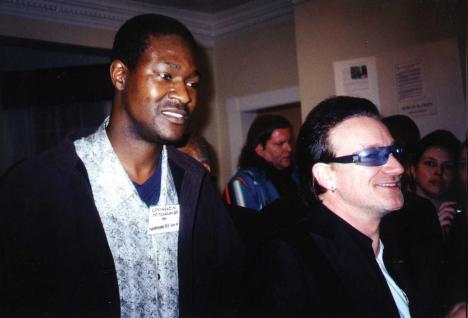
Lovingson Mtongwiza has set some huge goals for himself and the organization he founded.
He wants to generate awareness of the plight of the poor in Africa as well as mobilize financial and material resources so they get to the people who need them the most.
He is aware of what a huge job it will be.
“I think you know the old joke that if [you travel to] some African countries and you want to know who the poor [people are] just take an arrow and just throw it and [whoever it stabs] is a poor person,” he said.
Last semester Mtongwiza, a senior Journalism major, founded the Association of African Charities at NKU.
“The purpose of the organization…is to mobilize material and financial resources to help the poor in Africa,” said Mtongwiza. “Anybody called poor in Africa.”
Originally from Zimbabwe, Mtongwiza has experienced the poverty that he wants to help eradicate.
“It was always a dream [that I’ve had]. What can I do to help the next man?” he said. “Myself, throughout my life, I’ve been helped.”
Mtongwiza was helped when, as a high school student, he attended Prince Edward School in Harare, Zimbabwe where he was one of the first black students to attend the all white, government run school.
The students forced him to eat shaving cream while the teacher’s looked on. They called him a ‘block’ instead of ‘black’ and said the word was synonymous with students who were troublemakers, in an attempt to throw a veil over their racism.
Finally, a government minister intervened and things improved at the school.
Mtongwiza went on to study at the University of Zimbabwe and worked as a freelance journalist.
In 2000, with help from the Salvation Army, he came to America to study journalism.
Originally, he was going to enroll at Northwestern University, but decided to come to NKU when a friend recommended the school to him.
At NKU he got involved with Student Government where he now serves as a Senator. He’s also a member of the TKE fraternity.
Mtongwiza would like expand the AAC beyond it’s thirty members and possibly beyond campus someday, but he’s glad he founded it where he did.
“I thought starting it at school would be the best way because here at school you do a lot of trial and error,” he said.
The AAC is working on several projects now, focusing on gathering resources and building awareness of the problems facing Africa.
“Since it’s an organization that mobilizes material and financial support we also do awareness,” Mtongwiza said. “We sort of tell people what it is that Africa is in terms of poverty.”
He wants to make sure though, that his message doesn’t get mixed up with politics.
“I’m a politician, yes, I know. But this is…a separation of politics. We just [highlight] the poverty idea. We want to make an awareness of that. That’s an awareness of things like AIDS. An awareness of things like hunger.”
In December Mtongwiza was part of a small group of NKU students who were invited to listen to and meet with U2 frontman Bono, and his Heart of America caravan, when they made a stop in Cincinnati to talk about problems facing Africa.
Director of Student Life, Betty Mulkey, who helped organize the trip said Mtongwiza’s name came up consistently when she talked with faculty about who they thought would be a good candidate to go.
“He’s a student leader,” she said.
Mtongwiza used the meeting to do what he describes as “networking 101.”
He went around meeting with people, talking and taking down names and phone numbers.
“It’s fertile ground around here and out of it we are going to grow a movement,” Bono told the small crowd gathered at the Harriet Beecher Stowe House in Cincinnati.
Bono’s message focused heavily on AIDS, which killed 2.2 million Africans in 2001, according to UNAIDS, a joint United Nations program focusing on HIV/AIDS.
According to UNAIDS estimates, 29.4 million adults and children were living with AIDS in sub-Saharan Africa at the end of 2002.
In comparison there were an estimated 950,000 people living with HIV/AIDS in the United States at the end of 2001.
“Even if exceptionally effective prevention, treatment and care programmes take hold immediately, the scale of the epidemic means that the human and socioeconomic toll will remain massive for many generations,” reads a message on the sub-Saharan Africa fact sheet posted on unaids.org.
Bono said one of the problems was getting collected resources to those who need them.
“We have the drugs, we have the money, we just have to figure out a way of transferring them to people who need them the most,” he said.
For Mtongwiza this is a hurdle to get over as well.
“Just this morning I had a meeting with the Salvation Army trying to say…If I pick up resources, if I pick up clothes and stuff like that, how can we get [these] things over to Africa?” he said.
The AAC is working on two big projects for this semester, a thirty-hour hunger campaign and a play, which Mtongwiza is writing now.
Both events are designed as a way to promote awareness as well as generate donations.
Other, smaller events like cake sales and car washes are planned as well.
“We cannot wipe out poverty right away, but we’re going to take things in stages,” he said.

